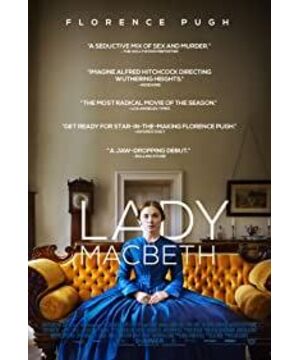1. At the beginning of the film, people will sympathize with the lady's fate, marrying into a celebrity family is like a canary kept in a cage. However, the plot of the film gradually revealed the "evil" of Mrs. Liszt in Lady Macbeth (2016) - Mrs. Liszt, the heroine Catherine, if what he asked for was love, it should be like a myth The character Medea does not hesitate to burn jade and stone, and there is no love in life, but in the end he betrayed and falsely accused the object of his affair in exchange for his personal survival guarantee, which is enough to see his love; if the wife pursues freedom, then when the outside world thinks that her husband is missing, Don't you just fall in love? There is no need to rack your brains every day for the inheritance of wealth.
2. What does Catherine Lister want? I think, after all, he doesn't really know what his ultimate pursuit of life is. Because there is no goal, only biological survival impulse and natural fear of death, so the life of the protagonist of the story can be said to be a checkpoint and a checkpoint. What this woman wants is a sense of freshness. In the first important line of the movie to the heroine, he said to her husband: "I like fresh air." Among them, the word "fresh" is particularly important! The pursuit of freshness here is nothing more than a protest against one's boring life, and it cannot really be said that there is a kind of longing and high pursuit of life (for example, liking the fresh air represents a break from friends and a return to the field), Rather - I don't know what I want, I just know I'm not happy with the status quo. Therefore, in the story of the movie, the protagonist is vicious but has no mercy, because he does not know and feel nothing about life and the nature of life.
3. You can also talk about what Sebastian, the object of Mrs. Liszt's derailment, wants. Just like Mrs. Liszt, he has no goals to pursue. At the most critical moment, when the child with the status of the heir entered the house, Sebastian was in a particularly embarrassing situation. He hid in the stable, pushed Liszt away, and shouted: "If I am found, I will die. So, that child is here, I am here, stay in this manor, that's fine." He finally betrayed his wife, not because he had awakened his benevolence after killing the child, but simply because the pressure from fear had to be released.
4. The inability of the maid to speak is pathologically mutism. Of course, there are other implications in art. In addition, the ending of the movie cannot be ignored. After all, one cannot have everything, right? Fame, status, wealth, lust, freedom, security or happiness, there are always trade-offs. The manor is empty, is Mrs. Liszt happy?
View more about Lady Macbeth reviews










